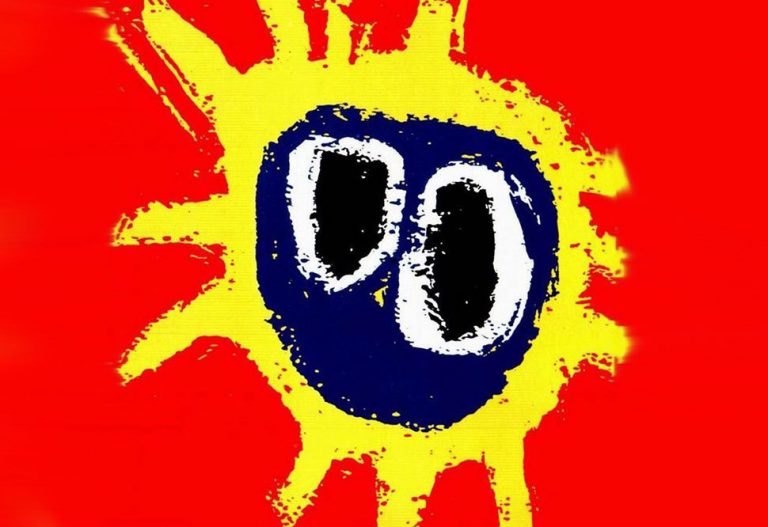“Just what is it that you want to do? Well, we wanna be free, we wanna be free to do what we wanna do. And we wanna get loaded and we wanna have a good time. And that’s what we’re gonna do.”
Screamadelica, the era-defining album by Glasgow’s Primal Scream, came out 30 years ago today in 1991. It’s the sound of people being free, to do what they wanna do, having a good time. Those lines at the beginning of ‘Loaded’ may have come from The Wild Angels, a 1966 road film, but it may as well have been coming from the band’s frontman Bobby Gillespie’s own mind; it’s a mission statement, a statement of intent, a statement of reinvention and renewal.
If you listen to Primal Scream’s preceding self-titled album from just two years before, you’ll think there’s been a mistake: this ragtag bunch of Velvet Underground wannabes can’t be the same people revelling in such exultant freedom in Screamadelica, you say to yourself, and you replay the songs and compare them again and you think something’s off. In the late 1980s, Primal Scream were a joke in the British media, staid rockers who were going nowhere.
Rarely has a band benefited more from the prevailing zeitgeist than Primal Scream though: the dawning of the 1990s in Britain was defined by acid house (and drugs); it was Manchester becoming Madchester; it was the ecstasy of ecstasy; it was bands like Happy Mondays having a band member there for the sole purpose of getting really high and shaking a maraca (god love Bez). The transcendent spirit of this time, eventually, overtook most, including Gillespie and co..
They became embroiled in the acid house scene and its records, discovering a freedom that formal rock had never provided them. Acid house changed Primal Scream into free sonic explorers, people let loose with their ideas. On Screamadelica, they brought rock inside the club; the record moulded swaggering rock with celebratory dance.

Love Indie?
Get the latest Indie news, features, updates and giveaways straight to your inbox Learn more
There is nothing original about Screamadelica, as Gillespie freely admits. Its heavy use of samples and sources gives it a kaleidoscopic quality, like the way Tarantino uses his myriad cinematic influences to make his pulp creations. They acted, similar to The Avalanches, as music curators, collating their endless inspirations – rave, post-punk, 1960’s psychedelia, acid house, krautrock, Tim Buckley, The Beach Boys – into a beautiful tapestry; sorry for being rock posers, Gillespie seems to be saying, here’s how good music can fucking be.
(There will be a temptation to declare Primal Scream’s transformation as insincere but a comparison to a recent example creates a distinction: where someone like Machine Gun Kelly fled rap for pop-punk and Travis Barker for purely commercial reasons, smelling the scent of where music culture was heading, Primal Scream come across as sincere devoted fans, wearing their influences on their sleeves proudly; it’s not mere cosplay).
Another vital thing happened for the band: they met Andrew Weatherall. A music writer and DJ, he had never been on the production side of a studio before. Weatherall came in with an entirely fresh perspective, no rules, no pretences.
His resulting work on Screamadelica is amongst the best album production work of all time. Nothing summed up Primal Scream’s collective transformation more than when Weatherall took ‘I’m Losing More Than I’ll Ever Have’, a song from their second album, and turned it into the ecstatic blues of ‘Loaded’. It’s euphoric and confident; it’s cleansing and uplifting. When Weatherall died in 2020 aged just 56, Gillespie rightfully paid tribute to the master behind their best record.

That Primal Scream soon retreated from this wondrous reinvented style on their following albums is, depending on who you ask, confirmation that it was all a ruse or simply a result of the changing times (the cocky Britpop of Oasis and Blur was just around the corner). I like to think it’s the latter; I like to picture Gillespie and his bandmates as genuinely moved by that period of their lives, sincerely putting out a record that was self-reflexive and authentic.
It doesn’t really matter though: Screamadelica is an era-defining modern classic, the sound of the most unbelievable transformation in modern music history. Listen to it today, on its 30th anniversary, and it hasn’t aged one day. I played it in Melbourne and was immediately liberated from the confines of lockdown; I hope it can do the same for you.




































